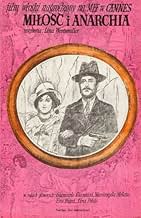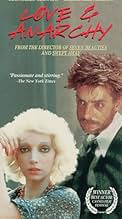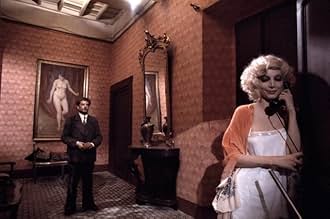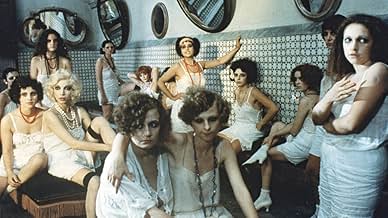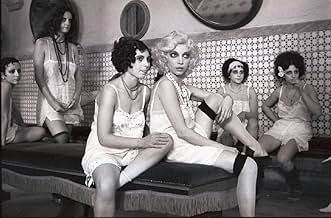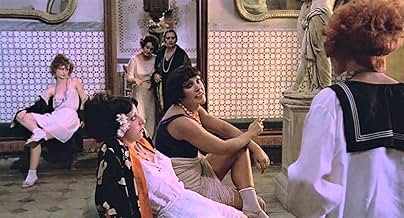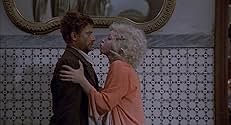Film d'amour et d'anarchie
Original title: Film d'amore e d'anarchia, ovvero 'stamattina alle 10 in via dei Fiori nella nota casa di tolleranza...'
IMDb RATING
7.7/10
3.7K
YOUR RATING
When a friend is murdered by the Facists, a melancholy farmer takes up residence in a Roman brothel as he and an anarchist prostitute plot to assassinate Mussolini.When a friend is murdered by the Facists, a melancholy farmer takes up residence in a Roman brothel as he and an anarchist prostitute plot to assassinate Mussolini.When a friend is murdered by the Facists, a melancholy farmer takes up residence in a Roman brothel as he and an anarchist prostitute plot to assassinate Mussolini.
- Awards
- 4 wins & 3 nominations total
- Director
- Writer
- All cast & crew
- Production, box office & more at IMDbPro
Featured reviews
Giannini at his best , a cult wertmuller movie that has been forgotten but it's a very good movie not only for Italian public but also for cinema lovers of all genres. it's the story of a poor man , Tunin which he must kill Mussolini during a ceremony. So he stayed for a couple of days in a house where there are women that offer sexual lends by paying. Tunin will fall in love with two of them and that will be negative for his mission. The excellent acting and the lina wertmuller's directing made this film a masterpiece and a realistic portrait of Italy of the '30. Giancarlo Giannini and Mariangela Melato are really wonderful and they show that Italian acting is at American level
To live like a dog or to die like a dog? It is an elemental question hovering above the head of a disaffected but weak-minded farmer Tunin (Giannini), after his anarchist friend being murdered by fascist police, he decisively joins the anarchist camp, and takes up his dead friend's cause, to kill Benito Mussolini. He arrives in Rome, and contacts his comrade Salomè (Melato), a premier prostitute in a brothel, who will assist to carry out his assassin plan. During a location scout with the unsuspecting Spatoletti (Pagni), the head of Mussolini's police division, Tunin falls for a young working girl Tripolina (Polito), will the mutually spontaneous romance spoil Tunin's determination of his action? Or, does it matter?
LOVE AND ANARCHY is Wertmüller's seventh feature, which debuted in Cannes in competition and won Giannini BEST ACTOR award. It is the second teamwork for Wertmüller, Giannini and Mariangela Melato, after THE SEDUCTION OF MIMI (1972), and they would try a third time in SWEPT AWAY (1974) one year later.
Freckle-faced, disheveled, Tunin is an honest but slow-witted countryside man, hasn't been to seaside before, he is not even a radical anarchist, but avenging the death of his friend, is the only thing he knows that can prove his worth, whether or not it is a suicidal mission. Fear is something he has to battle everyday, Giannini registers a viscerally soul-pulverising performance as Tunin, downplays his masculine charm and portrays him as a sympathetic, the salt of the earth sort, a cog in the machine, but radiates with those attributes what make human human. Mariangela Melato's Salomé, a spitfire driven by her own scores against the repressing government, is also superbly thrilling to behold, her piercing look, gravelly voice, worldly-wise flamboyance, and her unabashed camaraderie and affection towards Tunin, leaves a searing impact afterwards. A then 19-year-old Polito, a debutante in her full-fledged flapper outfit, thrusts herself into a more rational attempt to save her lover, only to no avail.
Wertmüller's resplendent depiction of the Italian brothel is certainly inspired by aesthetics of Fellini school, and her taste for music is admirably impeccable as well, whether it is classical pieces like Debussy's CLAIRE DE LUNE, or the catchy French ditty LA PETITE TONKINOISE by Vincent Scotto, together with Nino Rota's sentimentally melodious score, emotionality and vivacity are eternally among the national spirits running in the Mediterranean blood of Italian people, not even the ominous subject matter and demoralising situation can change its tonality.
Less heralded than Wermüller and Giannini's most acclaimed collaboration SEVEN BEAUTIES (1975), which earned both Oscar nominations (yes, Wermüller is the first woman who has even been nominated for BEST DIRECTOR), LOVE AND ANARCHY is no less a fine-crafted equivalent which speaks loud about its filmmakers' political slant and an outstanding melodrama can transfix its audience without compromising its thematic tragic.
LOVE AND ANARCHY is Wertmüller's seventh feature, which debuted in Cannes in competition and won Giannini BEST ACTOR award. It is the second teamwork for Wertmüller, Giannini and Mariangela Melato, after THE SEDUCTION OF MIMI (1972), and they would try a third time in SWEPT AWAY (1974) one year later.
Freckle-faced, disheveled, Tunin is an honest but slow-witted countryside man, hasn't been to seaside before, he is not even a radical anarchist, but avenging the death of his friend, is the only thing he knows that can prove his worth, whether or not it is a suicidal mission. Fear is something he has to battle everyday, Giannini registers a viscerally soul-pulverising performance as Tunin, downplays his masculine charm and portrays him as a sympathetic, the salt of the earth sort, a cog in the machine, but radiates with those attributes what make human human. Mariangela Melato's Salomé, a spitfire driven by her own scores against the repressing government, is also superbly thrilling to behold, her piercing look, gravelly voice, worldly-wise flamboyance, and her unabashed camaraderie and affection towards Tunin, leaves a searing impact afterwards. A then 19-year-old Polito, a debutante in her full-fledged flapper outfit, thrusts herself into a more rational attempt to save her lover, only to no avail.
Wertmüller's resplendent depiction of the Italian brothel is certainly inspired by aesthetics of Fellini school, and her taste for music is admirably impeccable as well, whether it is classical pieces like Debussy's CLAIRE DE LUNE, or the catchy French ditty LA PETITE TONKINOISE by Vincent Scotto, together with Nino Rota's sentimentally melodious score, emotionality and vivacity are eternally among the national spirits running in the Mediterranean blood of Italian people, not even the ominous subject matter and demoralising situation can change its tonality.
Less heralded than Wermüller and Giannini's most acclaimed collaboration SEVEN BEAUTIES (1975), which earned both Oscar nominations (yes, Wermüller is the first woman who has even been nominated for BEST DIRECTOR), LOVE AND ANARCHY is no less a fine-crafted equivalent which speaks loud about its filmmakers' political slant and an outstanding melodrama can transfix its audience without compromising its thematic tragic.
I saw this film two times in 1973 and a few years later again in art cinemas in the United States. I vividly remember the opening line, "I'm off to kill Mussolini. Screw the rest." While Fox Lorber put this film on DVD in 1997, it is now unavailable and sells for $37 used. I bought a made-in-China copy for $5 on Ebay. I was a bit upset when the first title read only "I'm off to kill Mussolini." I wondered why the change? Anyways the rest of the DVD seemed fine.
This is an amazing film. The acting by everyone is superb, with Giancarlo Gianini giving a performance that won him a best acting award at the Cannes film festival and should have won him an Oscar. He is Chaplinesque, but not imitative of Chaplin or anybody else. It is one of the most sympathetic performances ever given. In many scenes, he doesn't talk, but you sense his feelings of anger or sadness. His mass of freckles on his face make him look more like a 14 year old than a man planning a major political assassination. Mariangela Melato is sexy, foul-mouthed and hilarious. She also manages to make you believe that she is both a cynical prostitute and a politically and culturally aware anarchist. Lina Polito is the young prostitute with hope. She gives a performance similar to and as wonderful as Liza Minnelli in "Cabaret."
The musical score by Federico Fellini's main composer, Nino Rota, is energetic and terrific. It often counterpoints the action on the screen, bringing us away from it, and making some harsh scenes seem comical, but it also heightens the playfulness or menace in other crucial scenes. He won an Oscar for the Godfather Part II a few years later, but he deserved one here too.
This is a tribute to the European nihilist and anarchist movements of the 1800 and 1900's. It is also powerfully anti-fascist.
This is great and enthralling film-making. It is Lina Wertmuller's best film and still stands out today, nearly 40 years later, as a great historical and humanist work of art. It is sad that more people do not know about it and have not had the opportunity to experience it.
Having seen about 6,000 films (150 films X 40 years), I would put this one in the top twenty.
This is an amazing film. The acting by everyone is superb, with Giancarlo Gianini giving a performance that won him a best acting award at the Cannes film festival and should have won him an Oscar. He is Chaplinesque, but not imitative of Chaplin or anybody else. It is one of the most sympathetic performances ever given. In many scenes, he doesn't talk, but you sense his feelings of anger or sadness. His mass of freckles on his face make him look more like a 14 year old than a man planning a major political assassination. Mariangela Melato is sexy, foul-mouthed and hilarious. She also manages to make you believe that she is both a cynical prostitute and a politically and culturally aware anarchist. Lina Polito is the young prostitute with hope. She gives a performance similar to and as wonderful as Liza Minnelli in "Cabaret."
The musical score by Federico Fellini's main composer, Nino Rota, is energetic and terrific. It often counterpoints the action on the screen, bringing us away from it, and making some harsh scenes seem comical, but it also heightens the playfulness or menace in other crucial scenes. He won an Oscar for the Godfather Part II a few years later, but he deserved one here too.
This is a tribute to the European nihilist and anarchist movements of the 1800 and 1900's. It is also powerfully anti-fascist.
This is great and enthralling film-making. It is Lina Wertmuller's best film and still stands out today, nearly 40 years later, as a great historical and humanist work of art. It is sad that more people do not know about it and have not had the opportunity to experience it.
Having seen about 6,000 films (150 films X 40 years), I would put this one in the top twenty.
Giannini is hilarious as a dim-witted hayseed anarchist, who, en route to assassinate Mussolini falls in love. An exuberant, vital, full throttle feast of a film, mostly set in a lusciously decadent Roman brothel, where Wertmuller, (who also wrote the very witty script) successfully directs the extraordinary (and excellently acted) characters through wild changes of mood, and juggles powerful politics, tender romance, horrible farce and tragedy with exceptional flair. Rotunno's photography is delicious; the unusually potent period atmosphere is splendidly captured by Enrico Job (Mr Wertmuller) and the music by Rota/Savina is perfect. Wertmuller at her most accessible.
It's the second Wertmüller movie i watched. I liked a lot SWEPT AWAY. And this is even better.
It's hard to describe it in a foreign language since i am a non-native English speaker. It's multilayered, deep and there are a lot to uncover and a lot to make you contemplate. On the surface, there is a naive, simple country young man who gets entangled in pretty unknown situations to him, from women to Resistance and Rebels. You might even say this is a comedy for the most part.
But as the movie progresses, especially during the ending, it sets a lot of questions. Things are not exactly what they seem. Should we sacrifice ourselves for a higher purpose? Or it's delusional and vain? What is a hero? Are they being manipulated? Or it's better in any case to "die like a dog than to live like one?"
This is an anti-fascist movie and that is not something negotiabe in every logical human being. But as i said, it's not a simple and superficial movie. It makes you think.
It's a 2 hours movie and it doesn't drag for a second. At times, it's hilarious. Pace is great, acting is great, ending is powerful. A very good political comedy/drama/romance movie.
It's hard to describe it in a foreign language since i am a non-native English speaker. It's multilayered, deep and there are a lot to uncover and a lot to make you contemplate. On the surface, there is a naive, simple country young man who gets entangled in pretty unknown situations to him, from women to Resistance and Rebels. You might even say this is a comedy for the most part.
But as the movie progresses, especially during the ending, it sets a lot of questions. Things are not exactly what they seem. Should we sacrifice ourselves for a higher purpose? Or it's delusional and vain? What is a hero? Are they being manipulated? Or it's better in any case to "die like a dog than to live like one?"
This is an anti-fascist movie and that is not something negotiabe in every logical human being. But as i said, it's not a simple and superficial movie. It makes you think.
It's a 2 hours movie and it doesn't drag for a second. At times, it's hilarious. Pace is great, acting is great, ending is powerful. A very good political comedy/drama/romance movie.
Did you know
- TriviaErrico Malatesta, who is quoted at the end of the film, was an Italian anarchist propagandist and revolutionary socialist. He edited several radical newspapers and spent much of his life exiled and imprisoned, having been jailed and expelled from Italy, England, France, and Switzerland. After World War I, he returned to Italy where his Umanità Nova, an anarchist newspaper, had some popularity before its closure under the rise of Mussolini. Malatesta was a committed revolutionary. He believed that the anarchist revolution was inevitable and that violence would be a necessary part of it since the state rested ultimately on violent coercion.
- Crazy creditsBefore end credits: "I wish to repeat my horror that attacks, which besides being bad in and of themselves are also stupid, because they harm the very cause they are trying to serve...But those assassins are also saints and heroes...And they will be celebrated once the brutal facts are forgotten, and all that is remembered is the idea that inspired them and the martyrdom that made them saints.--Errico Malatesta."
- Alternate versionsFor the initial American release, editor Fima Noveck created a prologue which featured a montage of photos of Mussolini, along with a crawl explaining his rise to power and the violent activities sanctioned in his name during his reign.
- ConnectionsFeatured in Dietro gli occhiali bianchi (2015)
- How long is Love & Anarchy?Powered by Alexa
Details
- Release date
- Countries of origin
- Language
- Also known as
- Love & Anarchy
- Filming locations
- Parrocchia Santissima Annunziata, Piazza Reg. Margherita, 6, 04016 Sabaudia LT, Italy(Tunin cases the outside of the church)
- Production companies
- See more company credits at IMDbPro
Box office
- Gross worldwide
- $965
- Runtime2 hours 4 minutes
- Sound mix
- Aspect ratio
- 1.85 : 1
Contribute to this page
Suggest an edit or add missing content

Top Gap
By what name was Film d'amour et d'anarchie (1973) officially released in India in English?
Answer

